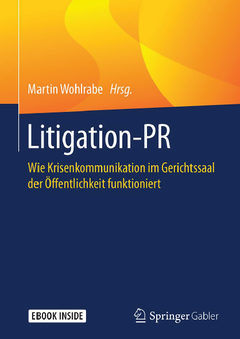Who
we are
We are a strategic PR Consultancy specialised in internal and external communication working closely with relevant editors. We are media experts who have worked for leading German publications, such as BILD and SPIEGEL Online. All our consultants hold law degrees, meaning we can combine extensive media experience with comprehensive legal and economic knowhow. The CEO Martin Wohlrabe and his team advise individuals, companies and public authorities. Wohlrabe is a visiting lecturer for strategic legal communication at the University of Freiburg.
What
we stand for
CONSILIUM represents modern strategic communication using traditional values: credibility, discipline and decisiveness. We combine legal expertise with practical communication knowhow, as anyone who uses one without the other will soon find themselves exposed to serious reputational risks. Following in the footsteps of Cicero, we see ourselves as forum makers for our clients to garner public interest. For us, PR strategy is an essential component of a comprehensive business strategy.
Who
we advise
International corporations, leading companies listed in the German stock market index DAX, medium-sized companies, government agencies and various associations engage us in strategic communication, media placement as well as risk communication and issue management. We are on hand whenever our clients need assistance with internal and external communication, public relations or reputation management. Our goal is to build a good reputation for our clients and to develop short- and long-term communication strategies.
…other things we do:
CONSILIUM´S legal communication summit
The largest annual Litigation PR event in Germany
At our legal communication summit hundreds of lawyers, company spokespersons and journalists meet to discuss Litigation PR. The event is hosted by CONSILIUM in partnership with prmagazin.
In recent years, guests and speakers have included the former Minister of Economic Affairs, Brigitte Zypries, media experts, such as Christian Schertz and Gernot Lehr, influential spokespersons from Airbus, Deutsche Bahn and Siemens, as well as numerous journalists from publications such as SPIEGEL, FAZ, Bloomberg News, Süddeutsche Zeitung, Juve and LTO.
Find out more at:
rechtskommunikationsgipfel.de
Our book on Litigation PR
Litigation PR: How crisis communication works in the public court of opinion

Today, a company involved in a legal dispute must not only convince the judges, but also the public. After all, what is the merit of a winning a legal dispute if the reputation is lost?
This book aims to prepare lawyers, speakers and managers for times when the reputation of their clients is at stake. The authors describe how they have experienced and solved PR crises, explaining how the media works and giving advice on how to survive in the public court of opinion.
The practical articles and interviews deal, among others, with the following issues:
- which strategies are promising in litigation PR and crises PR,
- what a strategic legal communication can achieve in various fields of law,
- what kind of experience those affected have had in dealing with media crises,
- how journalists research and report on legal disputes, and
- which legal aspects have to be addressed in the field of communication.
- 1. Kapitel: Mit Rechts- und Krisenthemen im Fokus der Öffentlichkeit: Worauf es bei überzeugender Litigation-PR ankommt
- 2. Kapitel: Litigation-PR im Großkonzern – Die Öffentlichkeitsarbeit am Beispiel Kartellschadenersatz
- 3. Kapitel: Diesel, Draghi und Durchsuchungen – Impressionen einer Journalistin im Dickicht zwischen Wirtschaft und Justiz
- 4. Kapitel: Im Auge des medialen Sturms: angeklagt, vorverurteilt, vernichtet
- 5. Kapitel: Fünf Leitlinien für die Kommunikation in der Krise
- 6. Kapitel: Kritische Medienberichterstattung- kein Schicksal für Unternehmen
- 7. Kapitel: Die Social-Media-Kommunikation während des Rechtsstreits um die Zutaten der Sorte Voll-Nuss
- 8. Kapitel: Der entfachte Skandal: Wie funktionieren Erregungsmechanismen in den Medien
- 9. Kapitel: Vom Tod des Kaufmanns - Litigation-PR in der Insolvenz
- 10. Kapitel: Was bei Litigation-PR aus juristischer Perspektive zu beachten ist
- 11. Kapitel: Prominenz im Wirtschaftsstrafverfahren: Macht der Bilder statt Kraft des Gesetzes
- 12. Kapitel: Litigation-PR im Kontext von Managementhaftung und „D&O“-Schadensbewältigung
- 13. Kapitel: Recht gut erklärt: Rechtskommunikation in Zeiten der Digitalisierung
- 14. Kapitel: Strafbefreiende Selbstanzeige von Prominenten – mediale und rechtliche Steuerungselemente
- 15. Kapitel: Kommunikation mit Leitmedien, insbesondere in Ermittlungsverfahren
- 16. Kapitel: Erfahrungen aus dem Wirtschaftsstrafrecht: Was medialer Einfluss für Strafverteidiger bedeutet
- 17. Kapitel: Marathonlauf Monitorverfahren – ganz oder gar nicht!
- 18. Kapitel: Von medialer Vorverurteilung, öffentlicher Kommunikation und warum er sich als Beschuldigter gegen das Schweigen entschied
- 19. Kapitel: Relevanz der Medieneffekte auf Angeklagte und Zeugen für Urteile in Strafverfahren
- 20. Kapitel: Zeitgemäße Medienarbeit von Gerichten – Erfahrungen im Umfeld von Wirtschaftsstrafverfahren rund um Hoeneß, Ecclestone und die Deutsche Bank
- 21. Kapitel: Medienrecht
- 22. Kapitel: Litigation-PR: Minimierung des kartellrechtlichen Schadenersatz-Risikos
- 23. Kapitel: Kommunikation im Umfeld der DSGVO: Wie Unternehmen bei Cyber-Attacken vorgehen
„The book is recommended for anyone involved in public communication.“
Brigitte Zypries on „Legal Tribune Online“ (LTO.de)
„Martin Wohlrabe knows from practical experience what he is talking and writing about. That is why he is successful.“
Martin Schramm - Existenz Magazin
„The book is worthwhile for anyone who is interested in how legal cases actually get into the media - (...) - and why they are told there, how they are told.“
(Deutsche Richterzeitung)
„The extremely varied selection of specialist articles and interviews is more than worth reading, not only for lawyers.“
(Going Public Magazin)
„Clever balance between general background on Litigation-PR and specialist knowledge. In the four interviews, the participants were surprisingly eager to provide information."
(Pressesprecher, Magazin für Kommunikation)
CONSILIUM STUDY with the University of Mainz
Judges are human too: The influence of the media on court proceedings


We have joined forces with the University of Mainz to conduct a research study on how the media influences criminal proceedings. A survey of a total of 580 judges and public prosecutors was carried out. Eleven German federal states participated in the survey: Bavaria, Baden-Württemberg, Brandenburg, Hessen, Mecklenburg-Western Pomerania, Lower Saxony, North Rhine-Westphalia, Rhineland-Palatinate, Saxony-Anhalt, Schleswig-Holstein and Thuringia. The subject of the survey included the use of media reports about the respective respondent’s proceedings, the errors in reporting that were perceived and the emotional reactions to media criticism.
The study was carried out under the academic leadership of Prof Dr Mathias Kepplinger (Professor for Empirical Communication Research) and the Managing Director of CONSILIUM, Martin Wohlrabe.
Many judges and prosecutors pay close attention to how their cases are reported in the media. One out of every two judges (53 per cent) and prosecutors (62 per cent) admitted they thought about the response from the public during their questioning and even during their summation when overseeing trials that attract mass media coverage.
55 per cent of respondents consult feedback or comments because they want to "get a picture of public opinion", "evaluate influences on those involved in the trial" (29 per cent) or want to determine "how widespread extreme opinions are" (25 per cent). The response to media criticism is often emotional. When asked how they spontaneously responded, most said they were "frustrated" (judges 50 per cent, prosecutors 65 per cent) and felt they were "unable to defend themselves properly." (Judges 45 per cent, prosecutors 46 per cent).
60 per cent of the prosecutors believe that the media is attracted to trials where the perpetrator "is a migrant or is of ethnic origin", or where the perpetrator "is expected to receive a particularly long sentence." 97 per cent of all respondents also found that criminal cases involving a celebrity, either as a victim or perpetrator, attracted wide media coverage.
Judges (10 per cent) and prosecutors (16 per cent) said they believe that the media influences "the course of the entire hearing". Furthermore, 30 per cent of judges and 42 per cent of prosecutors stated that media reports have an influence on "the atmosphere in the courtroom."
The vast majority of respondents considered the influence of online comments or media reports on laypersons such as victims (63%), the general public (87%) or even defendants (48%) as "strong" to "very strong".
And one in five prosecutors (20 per cent) believe the media has an influence on the testimony of witnesses in court.
Respondents also stated that "witnesses were intimidated by media reports." (27 per cent of judges, 41 per cent of prosecutors) and that "the media had an influence on the verdict because it changes the behaviour of victims, perpetrators or witnesses." (22 per cent judge, 36 per cent prosecutors).
The influence of the media is prompting the respondents to take action: one in four judges and almost every second prosecutor now asks the press offices to launch an active communication policy or even to launch strategies to counter the campaigns of defendants. More and more judges (24 per cent) are establishing an information channel with journalists, and one in three public prosecutors (33 per cent) is conducting press conferences on a regular basis.
This development clearly shows how much attention is being given to public opinion of courtroom procedures today.
Equally fascinating is that just 2 per cent of all judges and prosecutors in our study found that the media had a direct impact on the question of guilt. This is despite the fact that 33 per cent of judges and 48 per cent of prosecutors believe that "journalists want to influence the verdict".
CONSILIUM Survey
What business journalists think about the reputation of major law firms in Germany


With the Cum-Ex scandal, not only national daily newspapers, but also public television and radio stations highlighted the entire sector of large law firms for the first time.
We wanted to find out how business journalists today, quite a while after the climax of critical headlines, think about the reputation of the legal elite by means of a joint, anonymous online survey.
PR-Magazin Column
Each month we answer the “Litigation PR question of the month” from a PR-Magazin reader.

New developments constantly arise in Litigation PR, in particular with regard to changes in the media and regular legal amendments. Our Managing Director, Martin Wohlrabe, keeps us up-to-date by answering a question from a reader about Litigation PR every month in prmagazin. First published in 1969, prmagazin is the oldest PR sector magazine in Germany.
...And who we are looking for:
We are always on the lookout for new colleagues to join our team.
If you are interested in working for us please contact us via: bewerbung@consilium.media.
